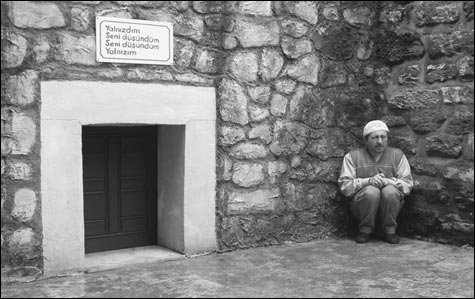
A MAN’S FEAR OF GOD Özer Kiziltan evokes Robert Bresson in this near-masterpiece. |
| The Seventh Annual Boston Turkish Film Festival | Museum of Fine Arts: March 27–April 6 |
Maybe one shouldn’t judge a country by its movies. What if the US were to be evaluated by the standards of the top 10 films at the box office, by the likes of Horton Hears a Who!, 10,000 B.C., and Never Back Down? Surely our image in the world would suffer. Nonetheless, after following the MFA’s Turkish Film Festival for the last seven years, I find this year’s selection suggestive of a nation that has become more inward and regressive.In a good way, perhaps. The films seem to reflect Turkey’s ongoing struggle to westernize versus the draw of its more fundamentalist traditions. They dramatize the conflict between the secular sophistication of urban society and the traditional rigidity of the rural areas. As the country rocks in inner turmoil — electing an Islamic party to rule for the first time in decades, debating human rights, pondering inclusion in the European Union, bleeding from a perpetual Kurdish uprising — popular cinema provides a forum where such troubles can be acted out. Such dissonance has also made for some of the more unusual and accomplished Turkish films in a while, among them one near-masterpiece that evokes Robert Bresson in its unblinking contemplation of rigorous piety.

Many of this year’s entries take place in isolated rustic enclaves rather than in the bustling environs of Istanbul. Abdullah Oguz’s BLISS (2007; March 29 at 2:45 pm) is set in a village not far removed from the Middle Ages. It opens with stunning shots of the shores of the Sea of Marmara; they are bleak and beautiful, troubled only by passing herds of sheep or, in this case, the twisted body of elfin Meryem (Özgü Namal, who bears an unnerving resemblance to Ellen Page).
Raped and left for dead, Meryem is rescued but remains silent as to her attacker. She doesn’t get much sympathy from the folks at home — her stepmother is a tormenting harpy and her father a spineless toady who doesn’t quibble when the ruling agha demands that Meryem be “taken care of” to protect the “purity” of the community. The agha’s pissed-off son, Cemal (Murat Han), has just returned from the army, where he served as a commando killing terrorists. His dad gives him an automatic pistol and two tickets to Istanbul, where he can eliminate Meryem in the anonymity of the big city.
As you might expect, Cemal can’t bring himself to do the deed, and the two shuffle off, knowing full well that the agha will be looking for them and that the conventions of such storytelling demand they fall in love. Meanwhile, in what seems another movie — one by a poor imitator of Nuri Bilge Ceylan, perhaps — a foppish professor (Talat Bulut) abandons his decadent city life and his rich, uppity wife and jumps on his yacht to sail the Sea of Marmara. Might Professor Irfan and Cemal and Meryem meet, their city and country ways complementing each other and showing the way to a new Turkey? Perhaps. More important, though, is that the villain in the piece is traditional patriarchal society and its enabling wives.
This theme recurs with some unexpected variations in Baris Pirhasan’s ADAM AND THE DEVIL (2007; April 5 at 1 pm), which also is set in an achingly picturesque backwater — in this case more like Mayberry than the Deliverance-like environs of Bliss. It’s the month of Ramadan, and the town has called in an itinerant imam to serve its spiritual needs. Hasan (Cem Özer) proves to be a forbidding, mysterious type with a beautiful young wife (Nurgül Yesilçay) and little daughter (Zeynep Özbay), both seemingly terrified of him. Hasan, then, is the “devil” in the title. Adam is a spunky little local kid whose mischievous personality helps unravel some of the curious circumstances surrounding the newcomers.
Things aren’t quite as simple as they are in Bliss. The villagers, for one, aren’t a bunch of inbred troglodytes but an appealing bunch of decent folks who act badly at first but then recognize their errors and amend their ways. In short, they don’t need the intercession of a yacht-sailing city slicker to solve their problems. And the wicked-seeming Hasan proves complex, intense, and self-reflecting. What he does may be destructive, but his motives are good. Or are they? He wants to know what he must do to be a good, God-fearing man.
So too does the protagonist of Özer Kiziltan’s A MAN’S FEAR OF GOD (2006; March 28 at 8 pm). Humble Muharrem (Erkan Can), a go-for in an Istanbul bag factory, is a devout worshipper who has no ambition other than to get closer to God. When the sheikh (Meray Ülgen), the head of the religious brotherhood he’s a member of, chooses him to run the “worldly” aspects of the order, Muharrem’s ascetic routine is overturned. He becomes, in effect, a rent collector tending to the community’s various Istanbul real-estate properties.